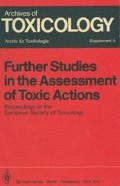Abstract
Mutagenicity tests are subdivided into screening tests and conclusive tests performed with mammals in vivo.
Using the short term tests it is possible to evaluate whether or not chemicals are potential mutagens. The mutagenic hazards for man, however, have to be established by tests on mammals in vivo. Where reproducible mutagenicity findings exist with conclusive tests, consideration of the possible threshold doses, together with benefit/risk equations should follow in order to decide whether the drug has to be witheld from the market or not.
Access this chapter
Tax calculation will be finalised at checkout
Purchases are for personal use only
Preview
Unable to display preview. Download preview PDF.
References
Allen, J. W., Latt, S. A.: Analysis of sister chromatid exchange formation in vivo in mouse spermatogonia as a new test system for environmental mutagens. Nature 260, 449–451 (1976)
Ames, B. N., Durston, W. E., Yamasaki, D., Lee, F. D.: Carcinogens are mutagens: A simple test combining liver homogenates for activation and bacteria for detection. Proc. Nat. Acad. Sci (USA) 70, 2281–2285 (1973)
Ames, B. N., McCann, J., Yamasaki, E.: Methods for detecting carcinogens and mutagens with the Salmonella/mammalianmicrosome mutagenicity test. Mut. Res. 31, 347–364 (1975)
Basier, A., Bachmann, U., Roszinsky-Köcher, U., Röhrborn, G.: Effects of caffeine on sister chromatid exchanges (SCE) in vivo. Mut. Res. 59, 209–214 (1979)
Bauknecht, T., Vogel, W., Bayer, U., Wild, D.: Comparative in vivo mutagenicity testing by SCE and micronucleus in mouse bone marrow. Hum. Genet. 35, 299–307 (1976)
Bayer, U.: The in vivo induction of sister chromatid exchanges in the bone marrow of Chinese hamster. Mut. Res. 56, 305–309 (1978)
Bayer, U., Bauknecht, Th.: The dose-dependence of sister chromatid exchanges induced by 3 hydrocarbons in the in vivo bone marrow test with Chinese hamsters. Experientia 33, 25 (1977)
Garbridge, M. G., Legator, M. S.: A host-mediated microbial assay for the detection of mutagenic compounds. Proc. Soc. Exptl. Biol. Med. 130, 832–834 (1969)
Röhrborn, G.: (ed.) Chemical mutagenesis in mammals and man. Berlin-Heidelberg-New York: Springer 1970
Röhrborn, G., Hansmann, I.: Induced chromosome aberrations in unfertilized oocytes of mice. Humangenetik 13, 184–198 (1971)
Röhrborn, G., Kühn, O., Hansmann, I., Thon, K.: Induced chromosome aberrations in early embryogenesis of mice. Humangenetik 11, 316–322 (1971)
Röhrborn, G., Buckel, U.: Investigations on the frequency of chromosome aberrations in bone marrow cells of Chinese hamsters after simultaneous application of caffeine and cyclophosphamide. Humangenetik 33, 113–119 (1976)
Röhrborn, G., Hansmann, I., Buckel, U.: Cytogenetic analysis of the pre- and postovulatory oocytes and pre-implantation embryos in mutagenesis of mammals. Handbook of mutagenicity test procedures. Kilbey, S. Amsterdam: Elsevier/North Holland Biomedical Press 1977
Röhrborn, G., Basler, A., Herbold, B., Peter, S.: Mutagenicity of polycyclic hydrocarbons. II. Monitoring genetical hazards of chrysene in vitro and vivo. Mut. Res. 48, 249–254 (1977)
Roszinsky-Köcher, G., Röhrborn, G.: Effects of various cyclophosphamide concentrations in vivo on sister chromatid exchanges (SCE) and chromosome aberrations of Chinese hamster bone marrow cells. Humangenetik 46, 51–55 (1979)
Roszinsky-Köcher, G., Röhrborn, G.: Increase in genetic activity of the polycyclic hydrocarbon benzo(a)pyrene by inhibition of the epoxide hydrase in an activation system in vitro. Mut. Res. 66, 199–203 (1979)
Schmid, W., Staiger, G. R.: Chromosome studies in bone marrow from Chinese hamsters treated with benzodiazepine tranquillizers and cyclophosphamide. Mut. Res. 7, 99–108 (1969)
Styles, J. A.: A method for detecting carcinogenic organic chemicals, using mammalian cells in culture. Br. J. Cancer 36, 558–563 (1977)
Vogel, W., Bauknecht, Th.: Differential chromatid staining by in vivo treatment as a mutagenicity test system. Nature 260, 448–449 (1976)
Author information
Authors and Affiliations
Editor information
Editors and Affiliations
Rights and permissions
Copyright information
© 1980 Springer-Verlag
About this paper
Cite this paper
Röhrborn, G. (1980). Assessment of Mutagenicity Tests. In: Chambers, P.L., Klinger, W. (eds) Further Studies in the Assessment of Toxic Actions. Archives of Toxicology, vol 4. Springer, Berlin, Heidelberg. https://doi.org/10.1007/978-3-642-67729-8_1
Download citation
DOI: https://doi.org/10.1007/978-3-642-67729-8_1
Publisher Name: Springer, Berlin, Heidelberg
Print ISBN: 978-3-540-10191-8
Online ISBN: 978-3-642-67729-8
eBook Packages: Springer Book Archive

